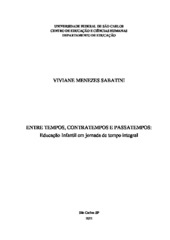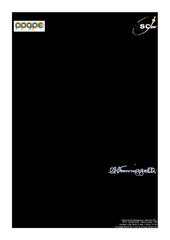| dc.contributor.author | Sabatini, Viviane Menezes | |
| dc.date.accessioned | 2021-06-22T21:42:16Z | |
| dc.date.available | 2021-06-22T21:42:16Z | |
| dc.date.issued | 2021-01-29 | |
| dc.identifier.citation | SABATINI, Viviane Menezes. Entre tempos, contratempos e passatempos: educação infantil em jornada de tempo integral. 2021. Dissertação (Mestrado em Educação) – Universidade Federal de São Carlos, São Carlos, 2021. Disponível em: https://repositorio.ufscar.br/handle/ufscar/14407. | * |
| dc.identifier.uri | https://repositorio.ufscar.br/handle/ufscar/14407 | |
| dc.description.abstract | Early childhood education in the country has been offered in a polarized way between schooling practices for part-time preschools and welfare practices for day-care centers on a full-time basis. However, since the incorporation of this last stage into the education system, there has been a transformation in the provision of care due to pressure from social movements. In addition, the very conception of a child, when changing historically, created the need to formulate educational policies that advocate the balance between caring and educating - two pillars of the triad that is completed with playing - as well as advances in studies on child development demonstrated the relevance of ensuring the quality of the experiences provided to young children in children's equipment, whether part-time or full-time. This research arises from the perception that the offer of full-time work, characterized by the child's long stay within the school space, demands the elaboration of quality educational policies so that, during the entire period spent at school, comprehensive formation is offered for this audience. As a problem, he questions whether, in extending the time spent in kindergarten, children would be guaranteed to play, educate and care, thus addressing their limits and possibilities. In this dimension, the general objective of the study is to analyze the supply and attendance of early childhood education in the school system of Rio Claro, a municipality in the interior of São Paulo; its specific objectives sought to characterize this reality in the researched education school system, as well as to examine the conceptions of children, childhood and early childhood education present in the official texts for education in the city where the research was located. As methodological designs, the research was undertaken through bibliographic research, document analysis and semi-structured interviews with the management team of the municipal education department. The results of the study showed that the main challenges and difficulties for the development of full-time educational work are related to the fragmentation between the care-to-educate functions and the persistence of care concepts still present in educational practices in early childhood education that work full time, that when they understand the role of the school as a place for childcare, they offer basic care and a hobby, thus compromising the comprehensive education necessary for childhood. Finally, the research points out that, although the legislation has advanced at the federal, state and municipal levels, there is still a need for improvement so that the integral education effectively occurs in the full-time day in Brazilian early childhood education. | eng |
| dc.description.sponsorship | Não recebi financiamento | por |
| dc.language.iso | por | por |
| dc.publisher | Universidade Federal de São Carlos | por |
| dc.rights | Attribution-NonCommercial-NoDerivs 3.0 Brazil | * |
| dc.rights.uri | http://creativecommons.org/licenses/by-nc-nd/3.0/br/ | * |
| dc.subject | Educação infantil | por |
| dc.subject | Jornada de tempo integral | por |
| dc.subject | Educação integral | por |
| dc.subject | Early childhood education | eng |
| dc.subject | Full-time journey | eng |
| dc.subject | Comprehensive education | eng |
| dc.title | Entre tempos, contratempos e passatempos: educação infantil em jornada de tempo integral | por |
| dc.title.alternative | Between times, setbacks and hobbies: full-time early childhood education | eng |
| dc.type | Dissertação | por |
| dc.contributor.advisor1 | Tomazzetti, Cleonice Maria | |
| dc.contributor.advisor1Lattes | http://lattes.cnpq.br/4821077407620769 | por |
| dc.description.resumo | A Educação Infantil no país vem sendo ofertada de modo polarizado entre práticas escolarizantes para pré-escolas de tempo parcial e práticas assistencialistas para creches em jornada de tempo integral. No entanto, desde a incorporação desta última etapa ao sistema de ensino, houve uma transformação na oferta do atendimento devido às pressões dos movimentos sociais. Além disto, a própria concepção de criança, ao se modificar historicamente, criou a necessidade de formulação de políticas educacionais que preconizassem o equilíbrio entre o cuidar e o educar – dois pilares da tríade que se completa com o brincar – bem como os avanços nos estudos sobre o desenvolvimento infantil demonstraram a relevância de garantir a qualidade das vivências proporcionadas às crianças pequenas nos equipamentos infantis, seja em jornada parcial ou integral. Esta pesquisa surge da percepção de que a oferta da jornada de tempo integral, caracterizada pela longa permanência da criança dentro do espaço escolar, demanda a elaboração de políticas educacionais de qualidade para que, durante todo o período passado na escola, seja ofertada uma formação integral para este público. Como problema questiona se, na ampliação do tempo de permanência nas escolas de infância, estariam assegurados às crianças, o brincar, o educar e o cuidar, abordando, assim, seus limites e possibilidades. Nesta dimensão, o objetivo geral do estudo é analisar a oferta e o atendimento da educação infantil em jornada de tempo integral na rede de ensino de Rio Claro, município do interior paulista; seus objetivos específicos buscaram caracterizar esta realidade na rede de ensino pesquisada, bem como examinar as concepções de criança, infância e educação infantil presentes nos textos oficiais para a educação no município lócus da pesquisa. Como delineamentos metodológicos, a pesquisa foi empreendida através da pesquisa bibliográfica, da análise documental e de entrevista semi-estruturada com a equipe gestora da secretaria de educação municipal. Os resultados do estudo demonstraram que os principais desafios e dificuldades para o desenvolvimento do trabalho educativo de tempo integral estão relacionados à fragmentação entre as funções cuidar-educar e à persistência de concepções assistencialistas ainda presentes nas práticas educativas na educação infantil em jornada de tempo integral que, ao entenderem a função da escola como local de guarda de crianças, oferecem cuidados básicos e passatempo, comprometendo assim a formação integral necessária para a infância. Por fim, a pesquisa aponta que, embora a legislação venha avançando nos níveis federal, estadual e municipal, ainda há necessidade de aprimoramento para que a formação integral efetivamente ocorra na jornada de tempo integral na educação infantil brasileira. | por |
| dc.publisher.initials | UFSCar | por |
| dc.publisher.program | Programa de Pós-Graduação Profissional em Educação - PPGPE | por |
| dc.subject.cnpq | CIENCIAS HUMANAS::EDUCACAO::CURRICULO | por |
| dc.publisher.address | Câmpus São Carlos | por |
| dc.contributor.authorlattes | http://lattes.cnpq.br/0576044942803068 | por |


